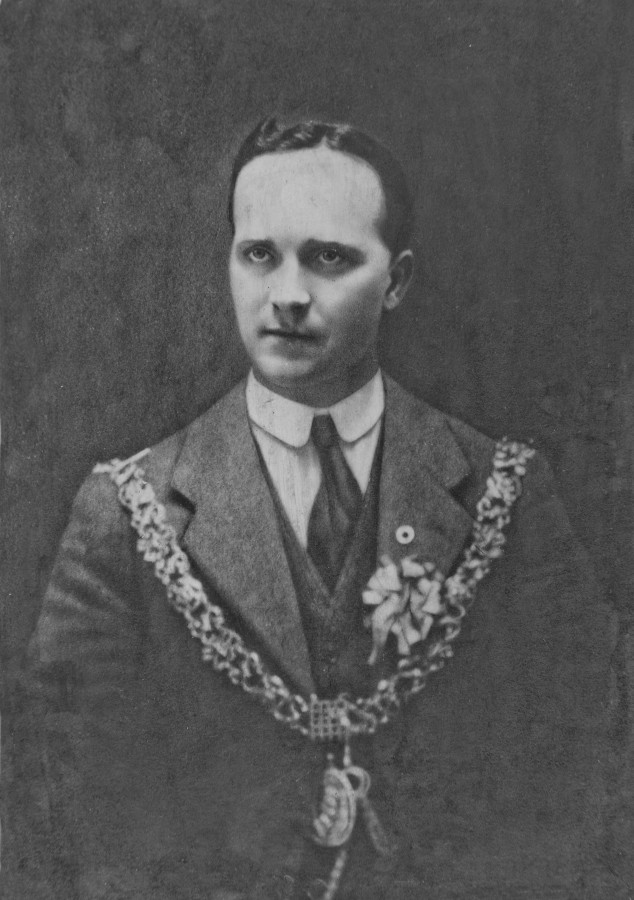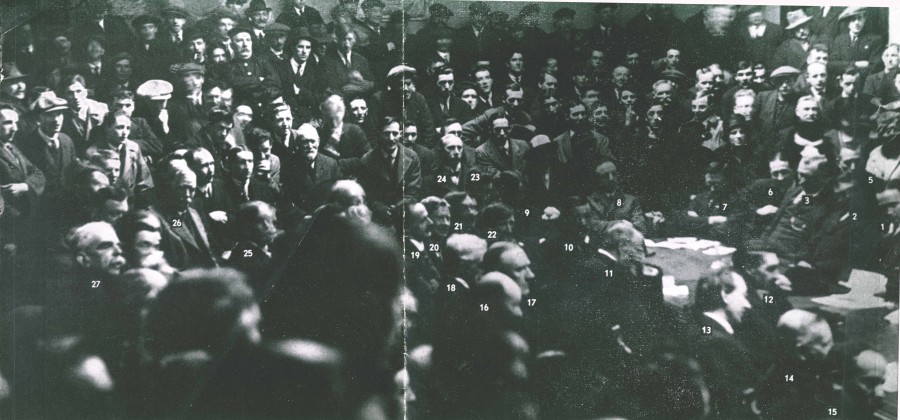
Kieran’s Our City, Our Town Article, 30 January 2020
Remembering 1920: Arise Lord Mayor Alderman Tomás MacCurtain
On 30 January 1920, one hundred years ago, the scene was set for Alderman Tomás MacCurtain to be declared elected as Lord Mayor in the Council Chamber of the old Cork City Hall. As Tomás rose from his seat in the Chamber to go to the Lord Mayor’s chair, much of the general public present cheered him. The men waved their hats and caps and the women their handkerchiefs. “The Soldier’s Song” was called for, and others shouted; “Up Blackpool” and as the newly-elected Lord Mayor signed the declaration accepting the office, The Soldier’s Song was sung.
The Cork Examiner outlines that Alderman MacCurtain signed the roll of office and on receiving the chain of office, the outgoing Lord Mayor, William F O’Connor addressed him, saying; “I congratulate you, and your party, on your election to this high office. I wish you a happy and prosperous year of office, and I trust that under your chairmanship, as first citizen, of Cork that the members of the Corporation shall strive unitedly in using their best efforts to advance our city’s interests and prosperity”.
Addressing the members, Tomás said his first duty was to thank Councillor O’Connor for his kind remarks on the taking the chair. He also thanked the members of the Corporation for having unanimously elected him to the position. He also wished to avail of the opportunity to thank the people of his ward who elected him alderman with a huge vote on the day of the election.
Tomás felt that in accepting the position of Lord Mayor he had a double duty to perform. Elected as he had been, as a Republican, he deemed his first duty would be to serve the principles of the Irish Republic. His next duty would be, as far as it were in his power, “to assist every party and every man and every citizen who had the interest of the country at heart in furthering the country’s interests, including local enterprises and especially the larger issue of the freedom of their country”. In carrying out his duties he denoted that every member, no matter to what party he or she belonged, would get every opportunity of putting forward any idea that he or she had in connection with the welfare of their city and their country.
Tomás continued in his speech that there were certain things in connection with the administration of the Corporation in the past that should be forgotten about and other aspects that should be emulated going forward. He expected from the members of the new Corporation a “sacrifice of time and a sacrifice, perhaps, of personal interest”. He expected from every member, no matter to what party they belonged to, that no self-interest would be put before the interest of the community at large.
Tomás recognised that his Sinn Féin party were very pleased at the result of the municipal elections. They were also pleased that certain minorities were represented in the Council, because they recognised that in every staple community they had minorities that were entitled to representation in the government of the affairs of the country. Their motto in the future would, in the first instance, be self-reliance and, in their normal business of the Corporation, efficiency and economy. He also referenced the importance of the Irish language: “The opening of their proceedings had been very auspicious for one thing that was very dear to his heart, as it was also dear to the heart of the Irish people and that was the Irish language”. He was delighted to hear it introduced into their proceedings. He hoped they would preserve that bi-lingual attitude in the Corporation proceedings until they had a Corporation in the future in which the business would only be completely conducted in the language of their country.
The minutes of the meeting, which survive in Cork City and County Archives, describe that the next business was to fix the Lord Mayor’s salary, which was set at £500 for the year. It was also decided to hold the quarterly meetings of the Council on the second Friday of April, July and October 1920 at 7pm.
The next business was to select three gentlemen qualified to fill the office of High Sheriff, so as to enable the Lord Lieutenant, to select out of the list the new High Sheriff. Sinn Féin Alderman Tadgh Barry said that that was a matter that deserved the very careful consideration of the Corporation. Sinn Féin had had a divided mind on the matter. He articulated that he had read the oath and stated – “it was an oath that no self-respecting Irishman could take”. They were not going to ask any Irishman to take it. It was a position created by what he described as “an alien Government in the country”; Tadgh continued “While in the past some people had been proud to take such a job, they would have nothing to do with such people in the future”. He moved and was successful that they do not fill the office, and that they leave it to Lord French to consider his own candidate.
Alderman Liam de Róiste then proposed a resolution that the Council pledge their allegiance to Dáil Éireann. Councillor Terence MacSwiney seconded, and it was passed by majority. He said that the authority of the Council must be definitely subject to some allegiance and they had next to consider what was the properly constituted authority in this country. Election of members to various committees was held at the subsequent Council meeting.
Captions:
1033a. Lord Mayor Alderman Tomás MacCurtain on his mayoral election night, 30 January 1920 (source: Cork City Museum).
1033b. Members of Cork Corporation in the old Council Chamber of the old Cork City Hall, 30 January 1920 (source: Cork City Museum).
